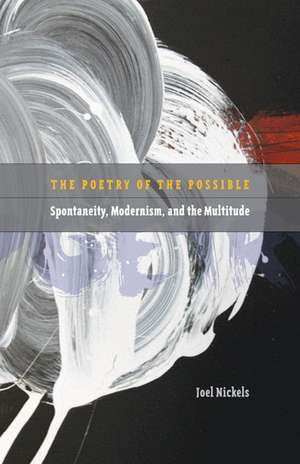Poetry of the Possible: Spontaneity, Modernism, and the Multitude
Autor Joel Nickelsen Limba Engleză Paperback – 5 iul 2012
The Poetry of the Possible challenges the conventional image of modernism as a socially phobic formation, arguing that modernism’s abstractions and difficulties are ways of imagining unrealized powers of collective self-organization. Establishing a conceptual continuum between modernism and contemporary theorists such as Paulo Virno, Michael Hardt, Antonio Negri, and Alain Badiou, Joel Nickels rediscovers modernism’s attempts to document the creative potenza of the multitude.
By examining scenes of collective life in works by William Carlos Williams, Wyndham Lewis, Laura Riding, and Wallace Stevens, Nickels resurrects modernism’s obsession with constituent power: the raw, indeterminate capacity for reciprocal counsel that continually constitutes and reconstitutes established political regimes. In doing so, he reminds us that our own attempts to imagine leaderless networks of collective initiative are not so much breaks with modernist forms of knowledge as restagings of some of modernism’s most radical moments of political speculation.
Setting modernism’s individual and collective models of spontaneity in dialogue with theorists of political spontaneity such as Antonio Gramsci, Herbert Marcuse, and Theodor Adorno, Nickels retells the story of modernism as the struggle to represent powers of collective self-organization that lie outside established regimes of political representation.
By examining scenes of collective life in works by William Carlos Williams, Wyndham Lewis, Laura Riding, and Wallace Stevens, Nickels resurrects modernism’s obsession with constituent power: the raw, indeterminate capacity for reciprocal counsel that continually constitutes and reconstitutes established political regimes. In doing so, he reminds us that our own attempts to imagine leaderless networks of collective initiative are not so much breaks with modernist forms of knowledge as restagings of some of modernism’s most radical moments of political speculation.
Setting modernism’s individual and collective models of spontaneity in dialogue with theorists of political spontaneity such as Antonio Gramsci, Herbert Marcuse, and Theodor Adorno, Nickels retells the story of modernism as the struggle to represent powers of collective self-organization that lie outside established regimes of political representation.
Preț: 219.11 lei
Nou
Puncte Express: 329
Preț estimativ în valută:
41.93€ • 43.92$ • 34.75£
41.93€ • 43.92$ • 34.75£
Carte tipărită la comandă
Livrare economică 09-23 aprilie
Preluare comenzi: 021 569.72.76
Specificații
ISBN-13: 9780816676095
ISBN-10: 0816676097
Pagini: 296
Dimensiuni: 140 x 216 x 36 mm
Greutate: 0.3 kg
Ediția:1
Editura: University of Minnesota Press
Colecția Univ Of Minnesota Press
ISBN-10: 0816676097
Pagini: 296
Dimensiuni: 140 x 216 x 36 mm
Greutate: 0.3 kg
Ediția:1
Editura: University of Minnesota Press
Colecția Univ Of Minnesota Press
Notă biografică
Joel Nickels is assistant professor of English at the University of Miami.
Cuprins
Contents
Acknowledgments
Introduction: Modernism and Spontaneous Organization
1. Rising from Nowhere: Self-Valorization in William Carlos Williams’s Poetry
2. Wyndham Lewis, Constituent Power, and Collective Life
3. “An Instantaneous Sympathy of Communication”: Laura Riding and the Politics of Spontaneity
4. Rhapsodies of Change: The Location of the Multitude in Wallace Stevens’s Poetry
5. Conclusion: Beginning Again
Notes
Index
Acknowledgments
Introduction: Modernism and Spontaneous Organization
1. Rising from Nowhere: Self-Valorization in William Carlos Williams’s Poetry
2. Wyndham Lewis, Constituent Power, and Collective Life
3. “An Instantaneous Sympathy of Communication”: Laura Riding and the Politics of Spontaneity
4. Rhapsodies of Change: The Location of the Multitude in Wallace Stevens’s Poetry
5. Conclusion: Beginning Again
Notes
Index
Descriere
The abstractions of modernism reimagined as figurations of collective self-organization
